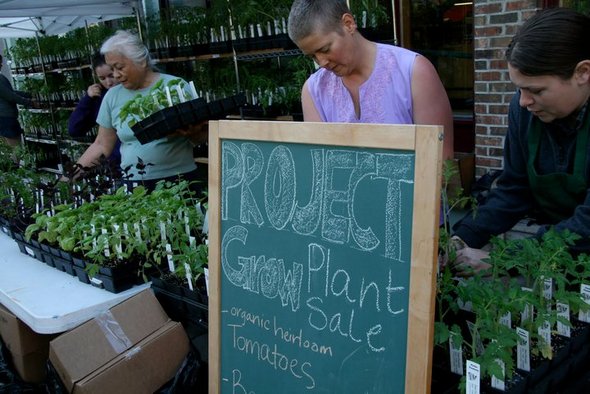Project Grow celebrates 40 years of community gardening

Project Grow's 2012 Plant Sale is Saturday, May 12 and Sunday, May 19 in front the People's Food Co-op.
Photo | Project Grow
The last frost date is still more than a month away, which I calculate by the timing of Project Grow Gardens' most amazing plant sale of heirloom tomatoes, basil, and peppers on Saturday, May 12 and Sunday, May 19 in front the People's Food Co-op. For gung-ho gardeners, they're even allowing pre-sale ordering until April 21, with pickup on Saturday and Sunday May 5 and 6.
This year Project Grow is offering 49 varieties of tomatoes, 11 hot peppers, 10 sweet peppers and five different kinds of basil that they are starting from seed in Dawn Farm's hoop house. If you want to try some of those tomatoes, mark your calendar for Saturday, Sept. 8, when Project Grow's Heirloom Tomato Tasting will be a highlight of the HomeGrown Festival for the fifth year in a row.
2012 is Project Grow's 40th anniversary, and they're planning to celebrate it. According to board vice president Lucas DiGia, they are "working on a project to curate all of the Project Grow history collected over the years: old newsletters, photos, newspaper clippings — where we've been and where we're going."
Jessica Stephens, the Site Coordinator at the Leslie Science Center garden, and a PhD candidate in History, has been leading that project. They are interested in hearing from community members who may have information to share.
Their website says: "Since 1972, Project Grow has been facilitating community gardens throughout Ann Arbor, making it the longest standing community garden organization in the nation."
In fact, one of the first urban gardening initiatives in the country started with Pingree's Potato Patches in Detroit in the 1890s. During a depression at the time, Detroit mayor Hazen Pingree convinced owners of vacant lots to donate arable land for community members to cultivate, thereby saving money for the city by providing food for the unemployed.
It's not clear if there's a correlation with Ann Arbor's bottom line (I believe the city no longer contributes funds to Project Grow), but according to DiGia, the "most valuable thing we provide is the space for people to grow their own food who don't have that space and support for gardeners through free educational classes and other organizations to support them in growing their own food."
Expanding from the first one-acre garden on Stone School road, Project Grow now has 15 garden sites scattered across Ann Arbor, providing more than 350 individual plots where gardeners grow organically. And they would like to increase the number of sites where they could make the most difference.
According to DiGia, Project Grow has been working closely with the city "to identify areas where there's less access to open garden space, for example with apartments or areas where people don't have space to grow, and have a systematic way of looking at where new gardens should be placed." Volunteer Eric Meves has been leading that work.
Project Grow has long promoted garden learning, but this year they are expanding their educational offerings to include bio-remediation of soil with vermiculture and mushrooms, education about the foods of other cultures, and wildcrafting, as well as their traditional classes on seed starting and seed saving. Their first class on Tomatoes and Peppers is April 14.
This year, Project Grow is expanding their programs at the Discovery Garden at the Leslie Science Center from a focus on children to one that encompasses lifelong learning, including adult education focused on growing your own food and kid summer camps.
Project Grow is working on several partnerships — they've already held a seed swap at Downtown Home and Garden with Ann Arbor 350. In other exciting news, a partnership with Ann Arbor public schools will take Eberwhite Elementary school's kitchen waste and turn it into Project Grow compost.
Another partnership with Cobblestone Farm has volunteers planting and tending a period garden with heirloom plants that would have been grown at the time Cobblestone was a working farm in the early 1800s.
Project Grow VP Lucas DiGia, whose Rap For Food promotes gardening and youth empowerment through projects like Veggie Rap notes, "Personally, I would say that what we offer is a conduit for people to gain access to gardening resources within the city of Ann Arbor."
I say Project Grow has a lot to celebrate this year. Happy 40th Birthday Project Grow! Carrot cake for you?
Kim Bayer is a freelance writer and culinary researcher. Email her at kimbayer at gmail dot com.

